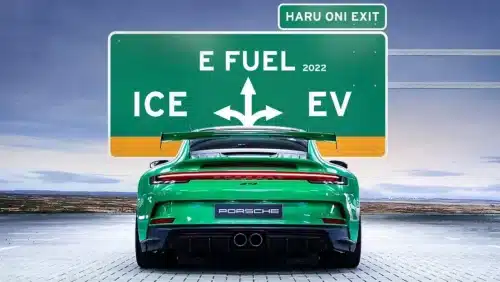Porsche in collaboration with Highly Innovative Fuels (HIF) have produced synthetic eFuels from water, carbon dioxide, and wind energy.

The fuel used in cars, typically gasoline or diesel, releases harmful emissions, including carbon dioxide and pollutants, contributing to air pollution and climate change. Dependence on fossil fuels raises concerns about resource depletion and geopolitical tensions. Fluctuating fuel prices impact consumers and economies. Shift to sustainable alternatives is vital for greener transportation.
Porsche, in collaboration with international partners and Chilean operating company Highly Innovative Fuels (HIF), have started the industrial production of synthetic fuels. The eFuels are derived from water and carbon dioxide using wind energy, enabling petrol engines to operate almost CO2-neutral, offering a promising solution for reducing carbon emissions.
Synthetic fuel: eFuel
The eFuel is a synthetic fuel developed by Porsche as a sustainable alternative to gasoline for their internal combustion engines. It is created through power-to-liquid (PTL), which utilises renewable electricity to convert water and carbon dioxide into liquid fuel. By combining renewable electricity, water, and carbon dioxide, eFuel is a drop-in replacement for gasoline, enabling Porsche vehicles to operate with reduced carbon emissions and environmental impact. This innovative approach highlights Porsche’s commitment to advancing sustainable mobility solutions. Porsche eFuel offers a significant advantage in terms of low carbon emissions. Produced using renewable electricity, this fuel eliminates carbon emissions during production.
When utilised in an engine, it only releases the carbon dioxide initially used to create it. As a result, eFuel boasts a substantially reduced carbon footprint compared to traditional gasoline, making it an environmentally responsible choice for sustainable mobility. The eFuel is specifically engineered to be seamlessly compatible with existing infrastructure, enabling its use in vehicles that currently run on gasoline. It can be conveniently pumped at standard filling stations, similar to gasoline, without requiring vehicle modifications. This compatibility ensures a smooth transition for drivers, allowing them to easily adopt Porsche eFuel as a sustainable and efficient alternative without requiring extensive changes or investments in their vehicles or refuelling infrastructure.
Future plans
Porsche plans to use eFuel in hybrid/electric cars for range extension and carbon footprint reduction. The eFuel is a clean, renewable fuel that can be used in any vehicle that currently runs on gasoline, making it a viable alternative to fossil fuels. The eFuel production initially targets 130K litres annually. Scaling aims for 55M litres per year by mid-decade, later reaching 550M litres.






